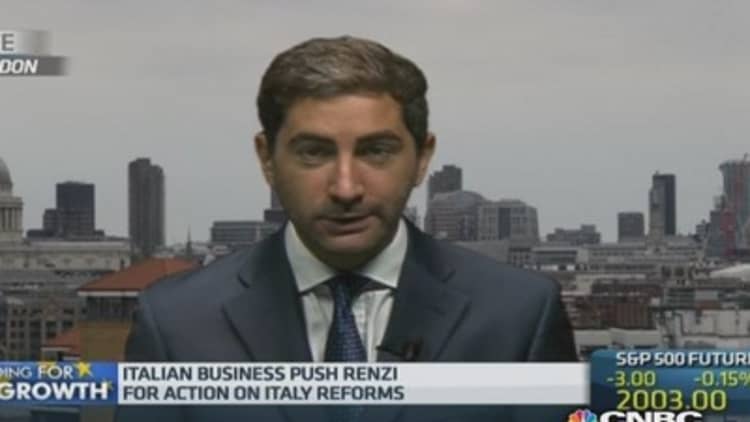Morgan Stanley has downgraded its euro zone economic growth forecast—despite the interest rate cuts and bond-buying program announced by the European Central Bank last week.
The American banking giant now expects GDP growth to average 0.8 percent this year across the 18 countries that use the euro, down from the 1.0 percent previously forecast. Growth next year is seen at 1.2 percent next year, down from 1.5 percent.
"Despite the ECB policy action, we are forced to revise down our cautious growth forecasts again. Not only did the recovery stall in the second quarter, but there have also been no clear signs of a reacceleration in actual economic activity yet," said economists led by Elga Bartsch in a research note published on Sunday.
Growth in the euro zone remained at 0.2 percent in the second quarter, disappointing economists and politicians who had hoped for stronger economic acceleration.
Germany, the euro zone's biggest economy, disappointed in particular, posting a 0.2 percent contraction in growth. The zone's second- and third-biggest economies of France and Italy reported zero growth and a 0.2 percent contraction respectively.
With low growth and deflation risks in mind, ECB President Mario Draghi announced a triple-rate cut last Thursday, along with purchases of both covered bonds and asset-backed securities (ABS)—a sort of private-sector version of the quantitative easing (QE) used by the U.S. Federal Reserve.
This is quite complex package of measures," Draghi told journalists at his regular press conference on Thursday.
"The purpose is very different from previous programs... the aim is to increase the measures that produce credit-easing… and also to significantly stir the size of our balance sheet towards the dimensions it used to have at the beginning of 2012," Draghi told a news conference on Thursday.
Read MoreECB's stimulus surprise: Reactions around Europe
Despite Thursday's announcement, and other stimulus measures unveiled in June, Bartsch said the ECB alone would be unable to prevent the "Japanification of Europe"—referring to the zero growth and inflation which Japan was mired in from 1991 to 2010.
"While we believe that the recovery will likely continue, we fear that it, at least initially, will remain lackluster," said Bartsch.
Morgan Stanley downgraded its growth forecasts for each of the euro zone's major economies on Sunday—including cutting Germany's 2014 outlook by 25 percent to 1.5 percent. Its growth forecasts for the euro zone as a whole are below those of the ECB—even though the central bank cut its predictions last Thursday. It now sees growth at 0.9 percent this year and 1.6 percent next.
Bartsch termed Germany a "reform laggard"—along with France and Italy—even though the former has led calls for reforms in struggling euro zone members like Portugal and Greece.

In an economics press briefing on Monday, Morgan Stanley economists said signs of revival in Germany were cyclical rather than fundamental—and could therefore prove temporary. They also forecast a slowdown in demand from Russia and central and Eastern Europe for German exports in 2015—although Germany posted record seasonally adjusted exports of 98.2 billion euros ($127 billion) this July.
Meanwhile, the investment bank said that the main downside risk for all of Europe was further escalation in tensions with Russia. Europe is expected to announce further economic sanctions against Russia this week, for its continued incursions and aggression in eastern Ukraine.
"In addition to the direct international trade, foreign investment and financial system linkages, the main risk, in our view, is a rise in uncertainty about the outlook in terms of geopolitics, escalating sanctions and energy concerns, denting economic confidence and spending propensity in the euro area itself," said Bartsch.
Moody's Analytics views overreliance on a natural gas imports from Russia as the biggest risk for Europe from the Russia-Ukraine conflict. Russia provides European Union nations with around a one-third of their natural gas imports, with a slightly smaller proportion coming from Norway.
—By CNBC's Katy Barnato

